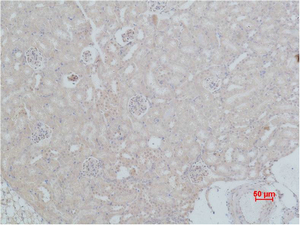HSC 70 Polyclonal Antibody
- Catalog No.:YN5559
- Applications:WB;IHC;IF
- Reactivity:Human;Mouse;Rat
- Target:
- HSC70
- Fields:
- >>Spliceosome;>>MAPK signaling pathway;>>Protein processing in endoplasmic reticulum;>>Endocytosis;>>Longevity regulating pathway - multiple species;>>Antigen processing and presentation;>>Estrogen signaling pathway;>>Prion disease;>>Legionellosis;>>Toxoplasmosis;>>Measles;>>Lipid and atherosclerosis
- Gene Name:
- HSPA8
- Protein Name:
- Heat shock cognate 71 kDa protein
- Human Gene Id:
- 3312
- Human Swiss Prot No:
- P11142
- Mouse Swiss Prot No:
- P63017
- Rat Swiss Prot No:
- P63018
- Immunogen:
- Synthesized peptide derived from the Internal region of human HSC 70. AA range: 588-638
- Specificity:
- The antibody detects endogenous HSC 70 protein.
- Formulation:
- PBS, pH 7.4, containing 0.5%BSA, 0.02% sodium azide as Preservative and 50% Glycerol.
- Source:
- Polyclonal, Rabbit,IgG
- Dilution:
- WB 1:500 - 1:2000.IHC:1:50-300.. IF 1:50-200
- Purification:
- The antibody was affinity-purified from rabbit antiserum by affinity-chromatography using epitope-specific immunogen.
- Storage Stability:
- -15°C to -25°C/1 year(Do not lower than -25°C)
- Other Name:
- HSPA8;HSC70;HSP73;HSPA10;Heat shock cognate 71 kDa protein;Heat shock 70 kDa protein 8
- Observed Band(KD):
- 70-72kD
- Background:
- This gene encodes a member of the heat shock protein 70 family, which contains both heat-inducible and constitutively expressed members. This protein belongs to the latter group, which are also referred to as heat-shock cognate proteins. It functions as a chaperone, and binds to nascent polypeptides to facilitate correct folding. It also functions as an ATPase in the disassembly of clathrin-coated vesicles during transport of membrane components through the cell. Alternatively spliced transcript variants encoding different isoforms have been found for this gene. [provided by RefSeq, Aug 2011],
- Function:
- function:Chaperone. Isoform 2 may function as an endogenous inhibitory regulator of HSC70 by competing the co-chaperones.,induction:Constitutively synthesized.,PTM:Phosphorylated upon DNA damage, probably by ATM or ATR.,similarity:Belongs to the heat shock protein 70 family.,subcellular location:Translocates rapidly from the cytoplasm to the nuclei, and especially to the nucleoli, upon heat shock. Identified by mass spectrometry in melanosome fractions from stage I to stage IV.,subunit:Interacts with HSPH1/HSP105. Interacts with IRAK1BP1 (By similarity). Interacts with PACRG and TSC2. Interacts with SV40 VP1.,tissue specificity:Ubiquitous.,
- Subcellular Location:
- Cytoplasm. Melanosome. Nucleus, nucleolus. Cell membrane. Localized in cytoplasmic mRNP granules containing untranslated mRNAs. Translocates rapidly from the cytoplasm to the nuclei, and especially to the nucleoli, upon heat shock.
- Expression:
- Ubiquitous.
- June 19-2018
- WESTERN IMMUNOBLOTTING PROTOCOL
- June 19-2018
- IMMUNOHISTOCHEMISTRY-PARAFFIN PROTOCOL
- June 19-2018
- IMMUNOFLUORESCENCE PROTOCOL
- September 08-2020
- FLOW-CYTOMEYRT-PROTOCOL
- May 20-2022
- Cell-Based ELISA│解您多样本WB检测之困扰
- July 13-2018
- CELL-BASED-ELISA-PROTOCOL-FOR-ACETYL-PROTEIN
- July 13-2018
- CELL-BASED-ELISA-PROTOCOL-FOR-PHOSPHO-PROTEIN
- July 13-2018
- Antibody-FAQs
- Products Images

- Western blot analysis of 1) Hela, 2) HepG2, 3) Raw, 4) Mouse Brain, 5) Rat Brain, 6) Rat Liver using HSC 70 Polyclonal Antibody. Secondary antibody(catalog#:RS0002) was diluted at 1:20000

- Immunohistochemical analysis of paraffin-embedded Mouse Kidney Tissue using HSC 70 Polyclonal Antibody.



